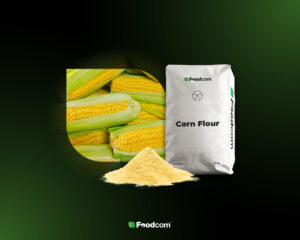- The import of corn into the EU has increased by 13% compared to the same period last year, mainly due to supplies from Ukraine.
- Most corn goes to Nigeria and North African countries, with a noticeable increase in supply.
- Wheat exports from the EU are 34% lower than a year ago, although the data may be incomplete.
- Weaker grain exports are the result of competition from Black Sea markets and poorer harvests in France.
Ukraine and Nigeria drive growth in EU maize imports
According to the latest data from the European Commission, from the start of the 2024/25 season (calculated from July 2024) to 6 April 2025, the European Union imported a total of 16.21 million tonnes of maize. This is an increase of 360,000 tonnes compared to the previous week and 13% more than in the same period last season. Ukraine remains the main supplier (9.17 million tonnes, 216,000 tonnes week-on-week), ahead of the USA (3.42 million tonnes) and Brazil. Among customers, the largest amount of maize went to Nigeria (2.33 million tonnes) and Morocco, which recorded a weekly increase in imports of almost 196,000 tonnes.
Other North African countries such as Algeria and Egypt also recorded significant growth. Also of note is the UK, which, despite Brexit, maintains high levels of purchases from the EU – now over 1 million tonnes for the season.
EU wheat exports overshadowed by incomplete data
The EU has exported 16.36 million tonnes of soft wheat so far, up 680,000 tonnes from the previous week, but down 34% from a year earlier. However, the European Commission points out that the data is incomplete – information is missing from Italy (last four months), France (since the beginning of 2024), as well as Bulgaria and Ireland. This means that actual volumes could be higher.
Romania remains the largest exporter (4.54 million tonnes), ahead of Lithuania (2.28 million tonnes), Germany and Latvia. Barley exports, meanwhile, reached 3.91 million tonnes – 150,000 more than a week earlier, but 19% less than a year ago. Experts point out that the weaker performance is influenced by competitive prices for Black Sea cereals and a poor harvest in France – traditionally the EU’s largest cereal exporter.
We encourage you to read the article: Agricultural raw materials – what are they and why should you invest?

![Grain exports weaken, corn imports accelerate [World News] Grain exports weaken, corn imports accelerate [World News]](https://foodcom.pl/wp-content/uploads/2025/03/News-world_22-1-1520x760.png)


![China-US trade war gains momentum after Beijing’s decision to impose 34 percent tariffs on US goods [World News] China-US trade war gains momentum after Beijing’s decision to impose 34 percent tariffs on US goods [World News]](https://foodcom.pl/wp-content/uploads/2025/03/News-world_22-3-600x300.png)
![Extreme weather conditions in 2025 – new challenges for the global agricultural raw materials market [World News] Extreme weather conditions in 2025 – new challenges for the global agricultural raw materials market [World News]](https://foodcom.pl/wp-content/uploads/2025/03/News-world_5-600x300.png)
![Coffee prices still high – will Brazil save the global market? [World News] Coffee prices still high – will Brazil save the global market? [World News]](https://foodcom.pl/wp-content/uploads/2025/03/News-world_15-600x300.png)

